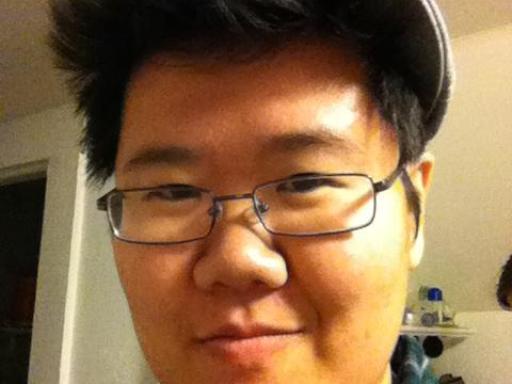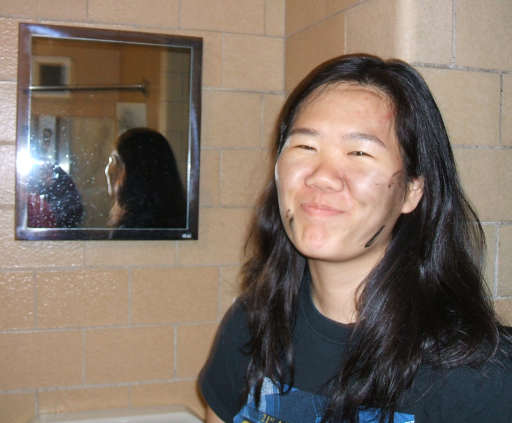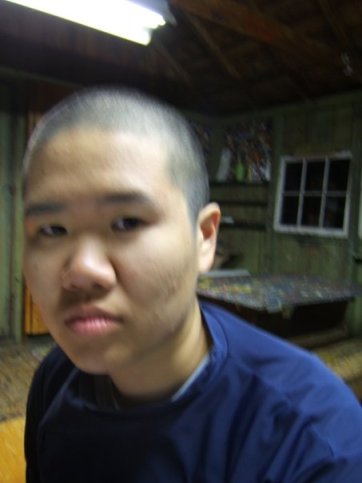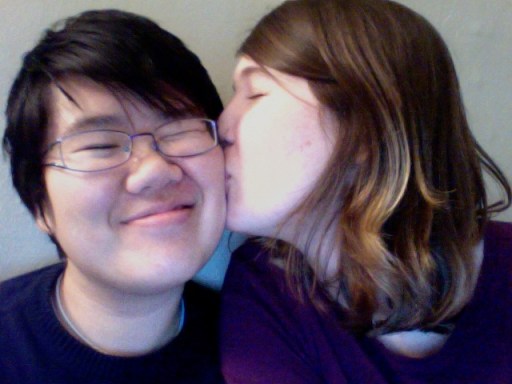I had a dream last night where my hair was long and black and cut to my shoulders. I remember it being natural, like it had always been this way and I had just never noticed. I remember running my hands through my hair, feeling the length of it touch my cheeks, my neck, my shoulders. When I woke up I plodded to the bathroom and stared at myself in the mirror, running my hands through my hair: buzzed on the sides, short on top. My head, a bristle-brush comb. I pull at the hair on the top of my head so it stands up from my scalp.
My grandfather didn’t recognize me the last time I saw him. The last time I went to see my family in New York City I sat in the kitchen on a stool next to my mom. He is in his nineties, bird-bone thin and frail, a sparrow, and all I think of when I see him is him in my ten year old eyes, watching him show me how to use an electrometer, pulling the parts out from boxes in a closet in the hallway. Now he turns to my mom and says in Toisanese, “Where is your little girl?” He puts his small thin hand out in the air close to the floor as if measuring the height of a six year old, measuring my height. My mom says in Toisanese, “She’s right here,” patting me on the shoulder. “She’s right here.” He looks at me, startled. My mom says, “It’s because of her short hair that you didn’t recognize her.”

I look into the mirror and I want to pull my hair, every follicle attached to a spool of black fishing line under my scalp. I want to pull and pull and pull until every strand is touching my shoulders. I want to pull until every strand is down to my knees. I pinch patches of buzzed hair between my thumb and forefinger but the tug never gives to the release and zip of a line thrown out to water. I want to undo every time I cut my own hair with a set of electric clippers in the kitchen of my apartment these past nine months, my wife going through and making sure the cut is even. I want to pull and undo my short masculine hair, my “Sir, do you need help with anything” in the supermarket, the “What can I get you, son?” at the diner, the “He was in line first,” at the movie theater.
I want to undo the hair that has inched me closer to who I am, made me feel the most like me that I have ever felt. It’s the hair that gave me the courage to tell airport security that I am female bodied when I went through the body scanner. It’s the hair that showed me the first step to figuring out how my body felt under men’s cut clothes, the courage to go into the section of the store where the male mannequins stood, the first step to binding, the first step to making my body my own.
It is the hair that has given me who I am but has made me feel farther from myself than I have ever felt. It is the hair that quieted me in my grandparent’s kitchen. I went to the living room to sit by myself after my grandfather didn’t see me, six years old, under his palm. The hair that meant I was growing up and getting old and he was growing old and getting older and it meant that things were changing and I was changing and he was changing. It was the hair that made me see how I didn’t fit into the four-foot space between his outstretched hand and the floor, measuring the inches of child-me, the one with the long hair, the one with the girl face, the one who has a place in my grandparents’ kitchen.

I first shaved my head in a cabin in Maine when I was 19, after I had come out to my parents and often found myself crying in the shower, on the train, in the bus, in my bed. When I first saw the hazy specter of myself in the flashlight-lit mirror in the dark of the bathroom, no hair to cover my scalp, the nape of my neck, I saw myself as my grandfather: hazy, myself but not myself. My head was the texture of someone else’s head. My body was a part of someone else’s body. I had made a mistake. I was losing parts of me in patches: The tuft of hair at the top of my head, the skin on my knees. I was losing myself and losing my family. All I saw in the mirror in the woods was what I missed: My father’s eyes, my mother’s cheekbones, my grandfather’s mouth. I found myself crying, hand on the sink, hand in my cactus hair.
I wanted to get it back. I started growing out my hair, sharp and jagged and haphazardly mulleted. I refused to cut it as it grew, feeling the length at the back of my neck as the return of something familiar. All I could do was wait for my hair to be long again to undo what I had done, to unsee what I had seen: An aging man, an aging granddaughter, a lack of time. I didn’t think about my hair much then, what it looked like. What I cared about was its length. I counted the inches, waited for the moment when it would be back to normal, when I would look the way I used to, and maybe he would look the way he used to, too.
But 12 months later, my hair grown into a bob cut, we were still old, and getting older, and I was still me and unhappy and gay and lonely and it didn’t fix anything. I wanted my hair to be a time machine, a way of going back. I was willing to do anything to get child-me back, the girl under my grandfather’s palm, the one he missed, the one he was wondering and asking about, instead of me, myself: Short men’s hair cut, plaid men’s shirt, deep voice, five foot eight. I was a foot and eight inches too tall, hair too short, missing someone even though he was right in front of me. I knew he missed me, too, sitting next to him, close enough to hold his hand.

I want to be the granddaughter he remembers so badly. I want him to see me and know that I am my mother’s daughter. I want him to believe that nothing happened in the last six years, after I came out, found myself alone, found myself no longer a daughter but a disappointment, my marriage a secret my parents don’t tell their friends. I want him to believe that I am the same girl I grew out of, the one with the long, long hair and braids. I want him to believe it so badly that I want to believe it, too: That I am a daughter who is welcome even though my mother asked me not to come to Christmas last year. I want to believe that I am accepted even though my grandfather does not know that I am married and this is a secret we will keep from him, now, until he passes away. I want to believe that I am loved and loved and loved even though I have to go to Thanksgiving alone, and this Christmas alone, in order to see my mother and father and brothers. I want to believe that it is easy, pretending like this is okay, that my wife is not a part of me, like my heart is not missing.
My dad tells me that this will take time, but he did not tell me that time hurts. It feels like all of this is my fault, but my wife tells me it isn’t when we are sitting on the couch, our foreheads pressed against each other, her hand on my cheek. It feels like if I could have fought more, things would be better. If I had done nothing at all, maybe things would be better. I want to undo it, as easy as letting my hair grow into shocks of black to my shoulders and elbows and knees. I would do it; I would let my hair grow to the floor. I would grow my hair out to the carpet. I would have it trail yards behind me as I walked. I would have it grow out the door, out of the apartment building, if I could. I would grow my hair out to cover the city if I could get it all back.

But my hair is still buzzed, clipped over my ears, and it was too late to grow my hair out for this Christmas, and I do not know how much time I have left with my grandfather. I want him to see me and know that it is me who is sitting next to him. I want him to know this one more time if I can. As I stand over my bathroom sink, staring into the mirror, I imagine my hair is a spool, and I pull out the length of the strands, one by one, willing them to luxuriously long lengths. I imagine myself as not myself, at my grandparents’ apartment this Christmas, wearing makeup, a women’s blouse, long hair combed to the middle of my back: What he thought I would grow up to be, what my mom thought I would grow up to be. I want to pretend that it is easy.
So I do: My hair is long, and I am straight and I have no wife; I am single, and I am happy. I am happy to see my family, and everyone greets me at the door and my grandfather sees me and calls me Whitney. My mother tells me that she told her friends about me at church, at her volunteer work, and that everyone is excited to see how I am doing. I am sitting on the stool in the kitchen and I know I belong, and I have never questioned this. I brush my hair out of my face, tuck the long locks behind my ear. I look up to see the faces of my family and I take this all for granted. I take it all for granted.
And then, I wake up.
Special Note: Autostraddle’s “First Person” column exists for individual queer ladies to tell their own personal stories and share compelling experiences. These personal essays do not necessarily reflect the ideals of Autostraddle or its editors, nor do any First Person writers intend to speak on behalf of anyone other than themselves. First Person writers are simply speaking honestly from their own hearts.







